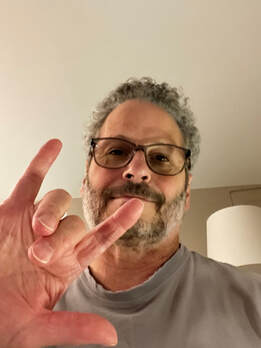Interview with Paul Hostovsky
1. The modern world is filled with a plethora of distractions. Yet in a sense, your poem is about anti-minutiae—or facing a moment in our lives when absolutely nothing among all “the colorful, breakable things” in the world can provide comfort or inspiration. How is this significant to the human experience?
Poetry is fiction, but I found myself in a hospital gift shop one day after having spent some time upstairs among all the sickness, pain, death and dying, and as I looked around at the glass knick-knacks and paperbacks and chachkas for sale, it struck me that there was nothing in that gift shop–nothing in life, for that matter–that could assuage (assuage is Webster’s Word of the Day today, so I thought I’d use it) all the beautiful catastrophes going on upstairs. Catastrophes that are perhaps only beautiful for the ways in which they bring us together over them.
2. How does creating poetry help you to understand yourself and/or reality?
I guess, in a way, poetry helps me to live with not knowing. “I do not know the thing I am,” says A Course in Miracles. I like that better than “Know thyself.” I neither understand myself nor reality. Which is why I love I don’t know. Because I don’t. And neither does anyone. All these people saying I think, and I think that, and What I think is…” What they should say, if they're honest, is I don’t know. Because they don’t. And neither does anyone. Poetry says I don’t know but look how beautiful. Which is the truest thing anyone could say.
3. Do you keep any favorite lines of poetry in the back pocket of your mind? Why do they resonate with you?
Not consciously, no. But when I’m writing I sometimes pull these poetic rabbits out of that back pocket, rabbits that really belong to other poets and writers whom I’ve loved and read and reread, like Tony Hoagland, Thomas Lux, and Jeffrey Harrison.
Paul Hostovsky makes his living in Boston as a sign language interpreter. His newest book of poems is Pitching for the Apostates (forthcoming, Kelsay Books). paulhostovsky.com
Poetry is fiction, but I found myself in a hospital gift shop one day after having spent some time upstairs among all the sickness, pain, death and dying, and as I looked around at the glass knick-knacks and paperbacks and chachkas for sale, it struck me that there was nothing in that gift shop–nothing in life, for that matter–that could assuage (assuage is Webster’s Word of the Day today, so I thought I’d use it) all the beautiful catastrophes going on upstairs. Catastrophes that are perhaps only beautiful for the ways in which they bring us together over them.
2. How does creating poetry help you to understand yourself and/or reality?
I guess, in a way, poetry helps me to live with not knowing. “I do not know the thing I am,” says A Course in Miracles. I like that better than “Know thyself.” I neither understand myself nor reality. Which is why I love I don’t know. Because I don’t. And neither does anyone. All these people saying I think, and I think that, and What I think is…” What they should say, if they're honest, is I don’t know. Because they don’t. And neither does anyone. Poetry says I don’t know but look how beautiful. Which is the truest thing anyone could say.
3. Do you keep any favorite lines of poetry in the back pocket of your mind? Why do they resonate with you?
Not consciously, no. But when I’m writing I sometimes pull these poetic rabbits out of that back pocket, rabbits that really belong to other poets and writers whom I’ve loved and read and reread, like Tony Hoagland, Thomas Lux, and Jeffrey Harrison.
Paul Hostovsky makes his living in Boston as a sign language interpreter. His newest book of poems is Pitching for the Apostates (forthcoming, Kelsay Books). paulhostovsky.com
